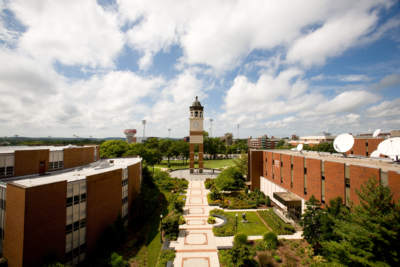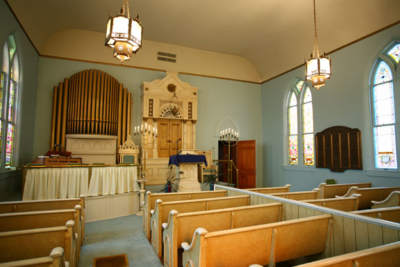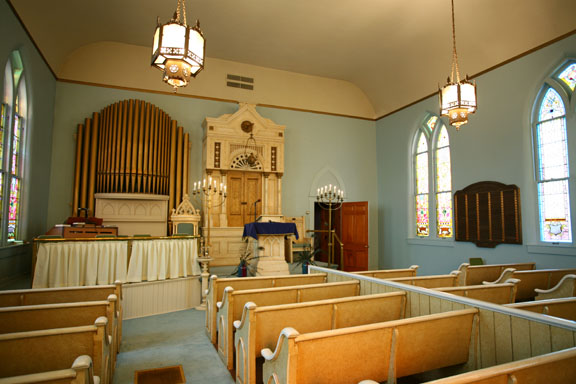
Being a Jewish student at Western Kentucky University (WKU) feels like attending college in a ghost town. There are no hallmarks of Jewish collegiate life here. No Hillel, no Jewish student group, not even a synagogue in Bowling Green, the town surrounding campus. It’s an experience of alienation, but ironically also the basis for connection.
I didn’t attend WKU to strengthen my Jewish identity. I came for the journalism program. My parents approved, with the compromise that I attend the Kelly Autism Program. The Kelly Autism Program is a program at WKU that assists students on the autism spectrum. My parents didn’t trust that I could attend school and functionally live on my own with all that entailed (studying, maintaining a room, attending class) without assistance. The program would offer me support with homework, a dorm room to myself, and any accommodations I needed in the classroom.
As much as I loathed the situation of having my entire living routine governed by a disability, it was a greater independence than what could be offered with four years of going to a commuter campus in Louisville and living under my parent’s roof. It was a freedom of a kind, and it would allow me to explore Judaism in a environment absent of a nominally Protestant stepfather and my ethnically Jewish (but spiritually disinterested) mother. Now, I could in some measure be independent to explore what it means to be a Jew.
At one of the many introductory meetings at Kelly before the semester started, out of the corner of my eye, I glimpsed a figure leaning against a chalkboard. Sensing a presence that was wholly different than my peers, I approached. The figure was close to my height, 5’6’’ or close to it, pixie-cut brown hair, and brown eyes. I introduced myself and Rachel “Rei” Blondheim introduced themself. We found out that we shared more than autism – we shared Judaism as well.
My understanding of Judaism at the time of meeting Rei was solely ethnic. My Jewish religious education was close to nonexistent. My Jewish background was comprised of several generations of Jewish apostates only kept Jewish through maternal birthright. My mother considered raising me Jewish, but she never did. According to her, it was due to my paternal family members, who are devout Protestants. I doubt this seriously.
The largest influence on my life was my mother. My father and mother divorced before I was one. My father was largely absent from my life. My mother styled herself for a great deal of my life as a heroic working-class single mother. Her third husband was picked to suit me as a father. My summers were picked to provide proper cultural education in arts. My life was groomed like a prized bonsai plant. Judaism was something pruned from my life.
My mother’s omission of truth ceased once I was in high school. I got curious about the Jewish heritage my mother had mentioned. I decided to embrace Judaism, a move my mother passively supported. My stepfather discouraged this and fumed that I was taking on a culture I was not brought up in – basically, masquerading. I never forgave him for this. His assault on my identity only inflamed my desire to explore Judaism.
Contrasting the shade of my secular rearing, Rei comes from an observant Conservative background. Rei hails from central Alabama near Montgomery, the state capitol. They had a bat mitzvah and attended shul through their pre-college years. The congregation they attended had a socially liberal mentality, but it had its limitations.
“It would probably be weird for me to… show that I have tattoos if I went back to synagogue back home,” they said. Inked onto Rei’s left arm is a koi. Visible from above their hip on the side of their abdomen is a poem titled “The Riddle of Strider,” written in the fictional Elvish Quenya language and Tengwar script. The poem comes from Tolkien’s “Lord of the Rings.”
Rei began the hunt for a college best suited for them during their senior year of high school. Rei toured many a university before settling on WKU due to its Chinese language program, the Kelly Autism Program, and the handsome campus landscape. When Rei toured the WKU campus, they were told by one of the student tour guides that there was a Jewish student organization of some kind, which initially excited them. But they were disappointed to discover that there was no such group, and that a small, scattered campus Jewish population couldn’t sustain the communal activities that a larger Jewish community might.
Rei felt dejected by the lack of Jewish life. Hope sprung forth, however, when a friend invited Rei to go on a day trip to Adath Israel, a synagogue in Owensboro, Kentucky, for Yom Kippur. They invited me to tag along. For me, this was the first time I had ever set foot into a synagogue as a practicing Jew. For Rei, this was a chance to finally find Jewish community in Kentucky. We both saw the opportunity presented by this temple: a chance at connection.

I remember that the day of the trip was cold. I remember piling into a small car packed to its full five-person capacity. Faint echoes of memory seep in about this several-hour ride from Bowling Green to Owensboro. Hunger that irritated anxiety. Feeling like a sardine.
Before this trip, religion to me was a social bonding, tribal trappings for a people in exile. Yet the fact was that I felt a deep, unabashed yearning to understand this element of my ancestry. Divine connection or natural intuition? Or was it my mother sliding across the works of Elie Wiesel, mentioning the importance of the Jewish people, and wearing Star of David earrings during my developmental years? You be the judge. Despite the taxing nature of the day, this was the most I had ever been engaged as a Jew.
We arrived at the synagogue. It had a pale vestige and faded stained glass with cracks lining the outside. The large wooden doors barely opened. The synagogue had hard wooden church pews that made me think of the times my paternal grandparents hauled me to church on Sundays.
Someone told us to hold off on mentioning politics to the rabbi, as he was opinionated and conservative. Rei latched on to this and grumbled that the service was being led by “some Republican grandpa” and that it contradicted her understanding of Jewish ethics. The congregation in attendance was largely Christian. They had responded to an ad in the local newspaper, I think, which had invited locals to worship here and uplift the dying Jewish population.
Rei sat next me on the hard pews. The rabbi spoke partly in Hebrew, partly in English. A small choir sung the portions in Hebrew. Synagogues don’t usually have choirs, Rei told me. They have cantors. The service was long. The rabbi was lethargic and the choir out of tune and out of step with the solemn nature of Yom Kippur. They were singing gospel.
When the service ended, a woman approached us. She talked about her interest in Judaism, which stemmed, she said, from distant heritage. She spoke of being a born-again Christian and started evangelizing to Rei, who declined and politely exited the conversation and the building with me in tow. The temple we had just been in had made a spectacle of our culture for a gentile audience. Rei summed it up: “It’s not a synagogue anymore. It’s a sideshow.”
The experience wasn’t a complete loss. Rei and I developed a friendship that lasts to this day. We entered that synagogue as relative strangers and left as friends. Rei says the whole ordeal “gave us a moment of bonding [over] incredulity. We bonded over weird.”
The bizarre experience helped me understand what it means to be part of a community as a Jew. Community means inclusivity and sensitivity, like Rei’s decision to invite me on this trip. In contrast to the alienating service, my new friendship felt even more holy.
Spencer Wells is a senior studying journalism at Western Kentucky University in Bowling Green, Kentucky.

